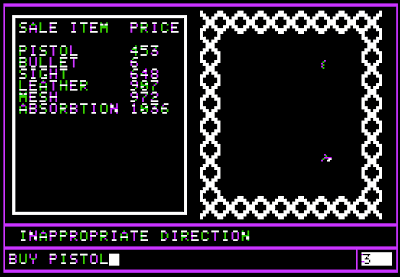Empire II: Interstellar Sharks
United States
Interactive Fantasies (developer); Edu-Ware Services (publisher)Date Started: 6 February 2014
It appears that I'm about to become the first person online to offer a detailed description of Empire II: Interstellar Sharks, and I'm not entirely sure I'm up to the task. The entire series--what it's trying to achieve, who its audience was, how seriously we're supposed to take the game documentation, what it's really about--continues to confuse me.
In September, I looked at Empire I: World Builders and noted that:
Empire is a uniquely weird game. Its weirdness begins with its manual, full of a propagandist history of the empire that offers an alternate take on human history, and continues with its interface, mechanics, and overall gameplay goals. If it was created today, I would suspect its creator to be a gifted but extremely disturbed person. But 1981 was a time in which video games were new, and common tropes not yet established, and this game comes from a creator (Edu-Ware Services) that specialized in educational software rather than role-playing games. Even with this understanding, playing the game feels a bit like indulging someone's lunacy.
Everything I said about the first game is true for the second. It comes with bizarre documentation of an alternate history and possibly-dystopian future. It features a quasi-simulation experience in which you have to go step-by-step through the most mundane things, like taking a flight from one planet to another: walk through the multiple screens of space dock, enter the passport office, apply for a passport, go to the ticket office, buy a ticket, present items at customs, go to the boarding area, enter the ship, exit the ship, present items at customs again. It has a combat system that's hardly used. Overall, it's hard to imagine anyone finding the game truly "enjoyable." I'd suspect that this game was designed amidst a lone creator's slow descent into irrecoverable madness--except that I know that the creator, David Mullich, went on to a productive and prolific career, including directing the Heroes of Might and Magic franchise for 3DO between 1999 and 2002. That Empire found a reasonably reputable publisher, which thought enough of it to publish the entire trilogy, also argues against the "lone psychopath" hypothesis. So I'm left doubly baffled by a series that seems to have been created by sane people, with an actual expectation to make a profit, and yet has all the fun of going through airport security. I feel like there's some obvious piece of the puzzle--some weird market trend that existed in the early 1980s that I forgot; some meta-theme completely going over my head.
Empire was an open-ended game in which you tried to survive as a pioneer on rugged planets, taking the role of a miner, homesteader, or missionary. It was set in the context of a new and expanding galactic empire. Empire II takes place some centuries later, with the planets colonized, and you act out one of three roles: pilot (trading commodities between planets), businessman (trading stocks and "carrying out covert operations for the company which he serves"), or diplomat ("execute assignments for the Empire"). Somehow, success in these areas will lead to the ultimate goal: a visit to the imperial home planet of Triskelion, where the manual promises some clue as to winning Empire III. The manual sets up this epic struggle by noting that "Gone are the days of frontiers and rugged individualism; red tape and regulations have become the obstacles of life amid the stars." I'm just not sure that red tape and regulations were precisely what every young RPG player was clamoring for in 1982.
The gameplay baffles me because it's boring (despite some exciting-sounding mechanics), but the manual baffles me because it's just crazy. The manual for the first game records an alternate history in which most of Earth is destroyed by a nuclear holocaust, and the first "perfect man," Gortus Lazur, forms an Empire from the ashes. There's a lot of pseudo-science and weird philosophy in the manual, and I don't know how seriously the player was supposed to take it, but it didn't have much bearing on the gameplay.
Empire II's documentation manages to top the first. The instruction manual is accompanied by The Memoirs of Yoram Lazur, the "twelfth empress of our great empire." (For some reason, Lazur's line is unable to produce any male offspring.) It takes the form of a long letter between an empress and her daughter-heir, and it cryptically imparts information about the bizarre game world, suggesting that the specific scientific breakthroughs and laws passed under each empress's rule have been planned for centuries, and that the Empress is really a puppet ruler at the mercy of a large bureucracy.
The tract indicates that empresses are impregnated by a host of consorts called "Reproductive Advisors"--the embryos are then whisked away to be raised by surrogates, and empresses never actually meet their daughters. There's a section where the empress rails against her advisors for introducing a new technique via which she will be artificially inseminated instead.
Oh, there's a lot more in the 18-page manual that I can't begin to comprehend. Strange anecdotes from the past (a few pages are given to the tempestuous relationship between an empress and a scientist named Escher who invented the "Mobius drive," 900 years earlier), allusions to the computers ("independent thinking machines") outpacing humanity, references to illegal worshippers of the "Lord of Light." I don't know if this is just supposed to be an original way to introduce the player to the history and terminology of the game world, or if it's all supposed to be a grand allegory, or what. Whatever the case, Mullich put a lot of effort into building an original and bizarre back story, none of which carries into the gameplay except a single appearance by the disciples of the Lord of Light.
The interface is an odd blend of adventure game, RPG, and simulation game. Like the first game, all progression is through text commands, of which the book lists more than 150 possibilities for verbs and nouns. Some are specific to certain locations and classes, but it's a lot to keep track of. For a long time, I couldn't catch a ship out of the spaceport because I didn't realize you had to BUY TICKET and then, separately, PAY.
Empire was an open-ended game in which you tried to survive as a pioneer on rugged planets, taking the role of a miner, homesteader, or missionary. It was set in the context of a new and expanding galactic empire. Empire II takes place some centuries later, with the planets colonized, and you act out one of three roles: pilot (trading commodities between planets), businessman (trading stocks and "carrying out covert operations for the company which he serves"), or diplomat ("execute assignments for the Empire"). Somehow, success in these areas will lead to the ultimate goal: a visit to the imperial home planet of Triskelion, where the manual promises some clue as to winning Empire III. The manual sets up this epic struggle by noting that "Gone are the days of frontiers and rugged individualism; red tape and regulations have become the obstacles of life amid the stars." I'm just not sure that red tape and regulations were precisely what every young RPG player was clamoring for in 1982.
The gameplay baffles me because it's boring (despite some exciting-sounding mechanics), but the manual baffles me because it's just crazy. The manual for the first game records an alternate history in which most of Earth is destroyed by a nuclear holocaust, and the first "perfect man," Gortus Lazur, forms an Empire from the ashes. There's a lot of pseudo-science and weird philosophy in the manual, and I don't know how seriously the player was supposed to take it, but it didn't have much bearing on the gameplay.
Empire II's documentation manages to top the first. The instruction manual is accompanied by The Memoirs of Yoram Lazur, the "twelfth empress of our great empire." (For some reason, Lazur's line is unable to produce any male offspring.) It takes the form of a long letter between an empress and her daughter-heir, and it cryptically imparts information about the bizarre game world, suggesting that the specific scientific breakthroughs and laws passed under each empress's rule have been planned for centuries, and that the Empress is really a puppet ruler at the mercy of a large bureucracy.
The tract indicates that empresses are impregnated by a host of consorts called "Reproductive Advisors"--the embryos are then whisked away to be raised by surrogates, and empresses never actually meet their daughters. There's a section where the empress rails against her advisors for introducing a new technique via which she will be artificially inseminated instead.
Oh, there's a lot more in the 18-page manual that I can't begin to comprehend. Strange anecdotes from the past (a few pages are given to the tempestuous relationship between an empress and a scientist named Escher who invented the "Mobius drive," 900 years earlier), allusions to the computers ("independent thinking machines") outpacing humanity, references to illegal worshippers of the "Lord of Light." I don't know if this is just supposed to be an original way to introduce the player to the history and terminology of the game world, or if it's all supposed to be a grand allegory, or what. Whatever the case, Mullich put a lot of effort into building an original and bizarre back story, none of which carries into the gameplay except a single appearance by the disciples of the Lord of Light.
 |
| Do they realize their "L" is backwards? |
The interface is an odd blend of adventure game, RPG, and simulation game. Like the first game, all progression is through text commands, of which the book lists more than 150 possibilities for verbs and nouns. Some are specific to certain locations and classes, but it's a lot to keep track of. For a long time, I couldn't catch a ship out of the spaceport because I didn't realize you had to BUY TICKET and then, separately, PAY.
The RPG elements come in the form of a set of standard D&D-style attributes, though with the addition of "senses," "psionics," and "aim." These are all rolled randomly, as is your sex. You then select the profession that goes best with your attributes.
 |
| I was doing good for a little while. |
The attributes are important, as they are the subject of frequent rolls to determine the success of game actions. For instance, getting contraband through customs requires an intelligence check, negotiating a treaty means a charisma check, escaping from the authorities means passing a speed roll, and successfully striking a blow in combat is dependant on strength. This is one thing the game does reasonably well, and it forces you to plan your character's actions around his strengths and weaknesses.
After you select your class, you head out to the spaceport, where you can either jump into your own ship (if you're a pilot) or take a commercial transport to another planet. The classes come with different starting items and credits; for instance, the diplomat automatically has a high-level passport to almost all the empire's planets, and the businessman has a trading pass for the stock exchange.
 |
| Lots of interstellar travel in this game, which has all the excitement of catching a flight in real life. |
Combat is essentially identical to the first game. Each character has a separate damage rating for his head, torso, left arm, right arm, left leg, and right leg. You engage in combat by typing movement commands (BACK, FORWARD) and attack commands (HIT HEAD, KICK TORSO, SHOOT LASGUN BODY). Each attack is followed by a roll against the appropriate attribute, at which point the game alerts you if you've hit your opponent, missed him, or fumbled and damaged yourself instead.
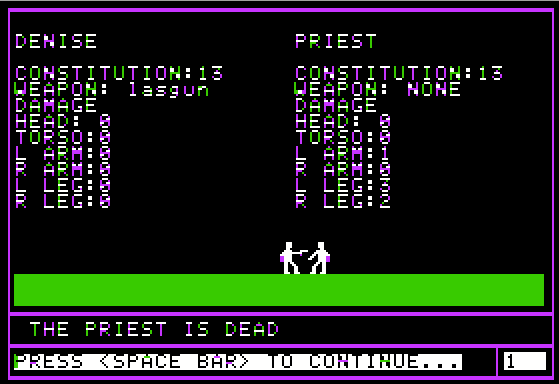 |
| Keep reading. I actually have a good reason for killing a priest. |
It's not a bad mechanic except for the rarity in which you need it. In about four hours of gameplay, I only had to fight one combat, though it was an option a second time when I was trying to evade arrest (I BRIBED instead). This is in sharp contrast to the first game, where combat came upon you with alarming frequency.
There are about eight planets visitable at the beginning of the game. Each has its own selection of stores, corporate offices, banks, medical offices, and embassies. Each planet consists of a straight road that wraps back on itself after six or seven screens; it's impossible to get lost. For some of them, going off the beaten path into the wilderness produces a special location, like a black market or an illegal temple to the Lord of Light.
 |
| Exploring the planet of Hwitrokken. |
Only one planet has a "mercenary" store that sells advanced weapons and shields, but these are all illegal, so if you buy any, you have to pass an intelligence check every time you try to clear customs--which you have to do twice on each journey. Given the lack of combat in the game, it doesn't make a lot of sense to carry these things around.
The game has a reasonably sophisticated crime-and-punishment system. You can ROB stores, STEAL from NPCs, BRIBE customs officials, buy and sell drugs, and murder people for their credits.
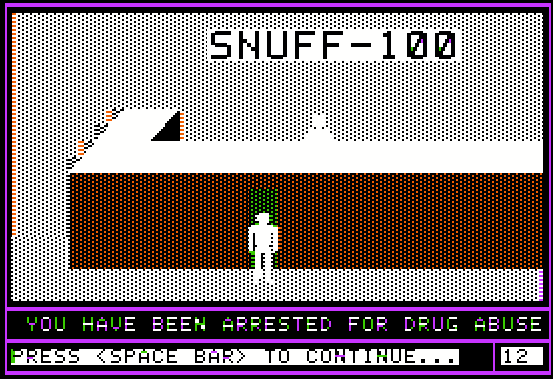 |
| I would think a key to avoiding a successful police raid is to not sell your drugs in a big building that says "hedonistic services." |
If you get caught at any of these things, you get sent to prison for several years. (Diplomats have "diplomatic immunity," but this can be revoked for serious crimes.) On one planet, Denieves, there's a "hedonistic services" building where you can gamble, buy drugs, or sleep with a prostitute. Each carries the risk of a raid that will land you in jail unless you FIGHT, BRIBE, or ESCAPE successfully. The gambling game is horribly weighted towards the house, so it doesn't help much financially, and visiting the prostitute also carries a risk of venereal disease. (Incidentally, I thought Wasteland was the first CRPG sex, but apparently it was much earlier.)
 |
| The candle is a nice touch. |
Whether you play a pilot, businessman, or diplomat, I think the goal is to amass enough funds to fully outfit your own ship, which you can then, somehow, fly to Triskelion. (None of the commercial flights will take you there.) Getting rich is proving quite difficult, and more than a little boring.
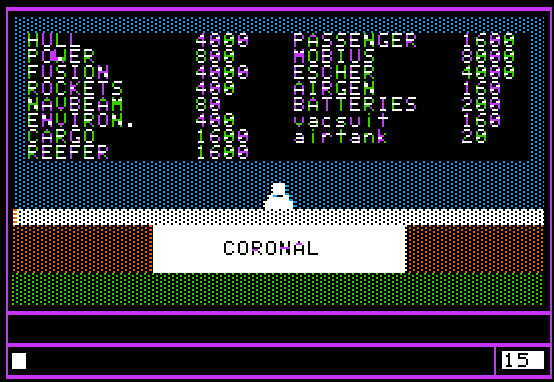 |
| Some of the many parts you need for a ship. |
I've done most of my playing with Denise the Diplomat. I find that the pilot class has way too many logistics to deal with, from buying the right amount of fuel for the ship, using "flight planning services" to PLAN a trip to a specific planet (they won't do Triskelion, so that's a bigger puzzle), taking the time to INSURE cargo, COLLECT impounded cargo, and so on. Even launching the ship involves enough steps to make a flight simulator proud. There are different flight considerations for intra-stellar and inter-stellar flight.
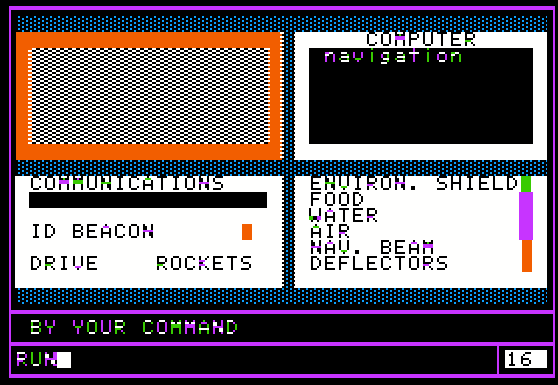 |
| The pilot's role is logistically complicated. |
The businessman has to mostly trade stocks, which is rather boring, as the prices only vary about 2% every 10 minutes.
 |
| Wow, is this exciting. |
The diplomat visits embassies to get diplomatic missions. Some of the missions I've been assigned are to collect taxes from all the corporations and different types of stores; assassinate the high priest of the Lord of Light worshippers on Apollin (this was the one necessary combat); carry a diplomatic pouch to another planet; negotiate a treaty with an alien ambassador; and negotiate mining rights on the one mining planet.
 |
| Denise has just passed a charisma check and has just successfully negotiated a treaty with the one known alien species. |
These sound exciting on the surface, but they're mostly about just getting to the right planet and entering the right building (with an occasional attribute roll). This process is complicated by a number of factors:
- There's no rhyme or reason to the system of getting commercial transport from one planet to another. The available ports of destination are randomly rolled the first time you visit the spaceport. More than once, I've had to fly aimlessly from planet to planet until a route finally opened to my destination. Buying tickets costs a lot of money, and it's been impossible for me to earn more than I've had to spend.
 |
| I'm sure these places are nice, but I really needed to go to Prothocole. |
- Embassies mysteriously disappear. I'll be given a mission to deliver a pouch on, say, Hwitrokken, but when I arrive on Hwitrokken, there's no embassy. I have to leave for another planet and then find my way back to Hwitrokken and hope the embassy is there this time.
- Sometimes, the mission is on a planet that is not visitable through commercial transport, so until I collect enough money to buy my own ship, I won't be able to complete the mission.
Going from one nondescript planet to another, having to PRESENT ITEMS at customs twice on each trip, trying to find the right combination of trips that will get you to the right place, watching your fortunes grow by pennies per hour . . . none of this is very much fun. I've started about six characters so far, and not a single one has died. Instead, they've just coasted to a stop. I get to the point where I can't get to the location of the next diplomatic mission, or afford passage to another planet, and I just run out of stuff to do. Again, the contrast between this and the first Empire game couldn't be more stark. In that one, you couldn't stay alive for more than 10 minutes; in this one, you can't get anything significant to occur.
The manual says that "Interstellar Sharks is the simulation of the complexities of modern day life projected onto a galactic scale." I guess I have to agree, but I find it bizarre that anyone thought players wanted a game like that, let alone make it. The game's good ideas (the stats checks, the crime system) are subsumed by a monotonous gameplay that contrasts starkly with the completely far-out game manual and back story.
I don't know how well Empire II did in its time, but the fact that the game is so lost (most mentions of it online are from people looking for it) seems to suggest that it isn't regarded as a beloved classic. I was lucky enough that one of my commenters, Odkin, had both the game and the manual. I keep meaning to ask him if he has Empire III, which is similarly lost. Knowing whether I'll be able to finish the series will probably matter a lot as to whether I bother to try to finish this game.
Later Edit: No one has been able to turn up a copy of Empire III. I heard from David Mullich and we had a brief e-mail exchange, but he didn't remember enough to be able to help me with the gameplay, and he didn't give me permission to post other aspects of our conversation on my blog. If I ever do find Empire III, I might give this game another try, but otherwise I'm going to move on.
Even Later Edit: I won Empire II over seven years after this initial entry. Read the second posting here.






















